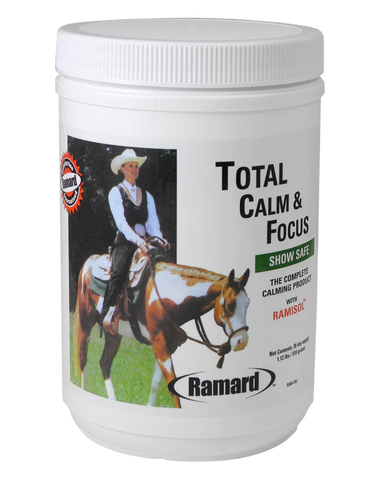TOTAL CALM & FOCUS
The paradox of these Magnificent, powerful animals is that the better we manage their anxiety and unease the better they will perform when the time comes for their best.
Since Horses are prey animals, they are highly attuned to their surroundings and quick to react to potential threats. This can make them susceptible to anxiety, especially in new or unfamiliar situations.
Many different things can cause horses to feel anxious, including:
- New environments or people
- Loud noises or sudden movements
- Travel
- Competition
- Pain or illness
- Lack of exercise or turnout
- Separation from other horses
Signs of horse anxiety
The signs of anxiety in horses can vary, but some of the most common include:
- Behavioral: Weaving, pawing, stamping, whinnying excessively, biting or kicking
- Physical: Sweating, trembling, increased heart rate and respiration, dilated pupils
- Cognitive: Difficulty focusing or learning, being easily spooked
How horses cope with anxiety
Horses have several natural coping mechanisms for dealing with anxiety. These include:
FIGHT/FLIGHT OR FREEZE
- Fight: If a horse cannot flee, it may resort to fighting. This is less common but can happen if a horse feels cornered or threatened.
- Flight: If a horse feels threatened, its first instinct is to flee. This is a natural survival response that helps horses to escape danger.
- Freeze: If a horse feels overwhelmed by anxiety, it may freeze. This is a way of making itself as small and inconspicuous as possible to avoid being noticed by predators.
How humans can help horses cope with anxiety
There are many things that humans can do to help horses cope with anxiety, including:
- Provide a safe and secure environment: This means creating an environment where the horse feels comfortable and relaxed. This may include providing a safe stall or paddock and access to other horses for companionship.
- Consider using calming supplements: One such Equine anxiety supplement used by Olympic Equestrian Teams around the world and by leading trainers and World & National Champions in every breed group is Ramard Total Calm & Focus. Let Total Calm & Focus eliminate your horse's stress and discontentment and allow you to return to safe and productive training, showing, or a relaxing trail ride.

- Establish a routine: Horses thrive on routine. Regular feeding, turnout, and exercise schedules can help horses feel more secure and less anxious.
- Be patient and understanding: Being patient and understanding with anxious horses is essential. Avoid punishing the horse for anxiety, as this will only worsen the problem.
- Seek professional help: If you are concerned about your horse's anxiety, it is vital to seek professional help from a veterinarian or equine behaviorist. They can help you to identify the underlying causes of your horse's anxiety and develop a plan to manage it.
- Exercise regularly: Regular exercise is a great way to help horses burn off excess energy and reduce stress levels.
- Provide plenty of turnouts: Turnout time allows horses to socialize with other horses and express their natural behaviors. This can help to reduce stress and anxiety.
- Use positive reinforcement training: Positive reinforcement training is a gentle and effective way to train horses. It can also help to build trust and confidence between the horse and its handler.
- Consider using calming supplements: Some calming supplements are available on the market that can be helpful for horses with anxiety. However, it is essential to talk to your veterinarian before giving any supplements to your horse.
Anxiety is a common problem in horses, but there are many things that humans can do to help them cope. Providing a safe and secure environment, establishing a routine, and being patient and understanding can help our horses feel more relaxed and less anxious.
Thank You for being a Caring Horse Owner.









